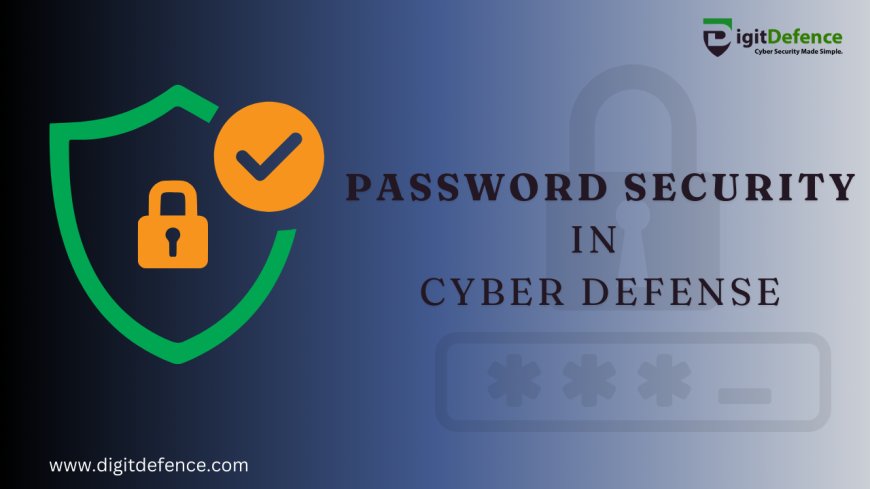Password Security in Cyber Defense Strategies
Explore effective password security in cyber defense strategies. Learn key tips to protect your digital assets. Stay secure online!

Password security is a critical aspect of cyber defense strategies. With the exponential growth of cyber threats, including hacking, phishing, and data breaches, ensuring robust password security measures is essential. Weak passwords are often the gateway for unauthorized access to sensitive information, making them a primary target for cybercriminals.
In our internet-connected lives, password security is critical as the first defense against cyber attacks. Hackers use advanced methods like brute force and social engineering to exploit weak passwords. Common practices like using easily guessable passwords or reusing them increase vulnerability. To strengthen security, it's crucial to create strong, unique passwords and regularly update them. Employing multi-factor authentication and password managers adds an extra layer of protection. Educating users, conducting security audits, and staying updated on patches are vital strategies for individuals and organizations to mitigate cyber risks effectively.
The Impact of Strong Password Strategies
Strong, Unique Passwords:
Organizations and individuals must create passwords that are robust and unique for each account. Lengthy passwords incorporating a mix of uppercase and lowercase letters, numbers, and special characters are harder to crack. Avoid using easily guessable information like birth dates or common words.
Enforce Password Policies:
Organizations should establish and enforce stringent password policies. These policies should mandate strong password complexity requirements and regular password updates. Prohibit password reuse across multiple accounts to prevent potential security breaches.
Multi-Factor Authentication (MFA):
MFA significantly enhances security by requiring additional verification beyond passwords. This could include codes sent to mobile devices or biometric confirmation, providing an extra layer of defense even if passwords are compromised.
Leverage Password Managers:
Password managers are invaluable tools for generating, storing, and auto-filling complex and unique passwords. Encourage their use to eliminate the need for individuals to remember multiple passwords, minimizing the risk of weak or recycled passwords.
Educational Initiatives:
Regularly conduct training sessions and awareness programs to educate employees or users about password best practices. Explain the importance of strong passwords, the risks associated with weak ones, and methods to identify and avoid common phishing tactics used by cyber attackers.
Routine Audits and Updates:
Organizations should conduct frequent security audits to identify vulnerabilities in their systems. Timely patching and updates are crucial in safeguarding against potential cyber threats. Regular software updates ensure that security features are up-to-date.
Access Limitation:
Implement the principle of least privilege to restrict access to sensitive data or systems. Grant access only to necessary resources to minimize the impact of a potential breach if a password is compromised.
Anomaly Monitoring:
Employ monitoring systems that detect unusual login attempts or behaviors. This enables quick identification of potential security breaches, allowing for immediate response and mitigation measures.
Password Change Considerations:
While periodic password changes can be beneficial, the emphasis should be on creating strong, unique passwords rather than frequent changes. Consider context-specific factors when determining the frequency of password updates.
Continuous Education and Adaptation:
Stay informed about the evolving landscape of cybersecurity threats and best practices. Regularly update security protocols and strategies to adapt to emerging threats and enhance overall security measures.
By integrating these practices into their security protocols, both organizations and individuals can significantly reduce the risk of unauthorized access and data breaches due to weak password security.
The Crucial Role of Strong Passwords in Data Protection
Data Protection Safeguard:
Passwords act as the primary shield, guarding a treasure trove of information. Whether it's personal emails, financial records, or confidential business data, passwords serve as the initial barrier to preventing unauthorized access and ensuring the confidentiality and integrity of sensitive information.
Preventing Costly Data Breaches:
Weak passwords are a favorite target for cyber attackers aiming to breach systems. They often exploit these vulnerabilities to gain unauthorized entry, leading to colossal data breaches. Strengthening password security measures is akin to fortifying the castle walls against invaders. Doing so significantly reduces the risk of financial losses, reputational damage, and legal repercussions that typically accompany such breaches.
Regulatory Compliance and Assurance:
Compliance with data protection regulations is a top priority for organizations. Many regulatory frameworks, such as GDPR, HIPAA, and PCI DSS, mandate stringent password policies as part of security measures. Adhering to these standards is not just about meeting legal requirements; it's a testament to an organization's commitment to data security and customer privacy. Compliance not only mitigates risks but also enhances trust among stakeholders, demonstrating an organization's dedication to safeguarding sensitive information.
Securing Personal and Professional Lives:
Strong passwords aren't just about protecting corporate networks; they're equally crucial in personal online security. They safeguard personal emails, social media accounts, and online banking information. Ensuring strong passwords across personal and professional realms is vital in maintaining overall digital safety.
Mitigating Financial and Reputational Risks:
The fallout from a data breach extends beyond financial losses. It can irreparably damage an organization's reputation. Customers lose trust, stakeholders become wary, and the brand's integrity suffers. Strengthening password security plays a pivotal role in mitigating these risks, bolstering an organization's resilience against cyber threats.
Proactive Risk Mitigation:
Investing in strong password practices is a proactive approach to cybersecurity. It's about anticipating potential threats and mitigating them before they manifest. By emphasizing strong password protocols, organizations build a robust defense system against ever-evolving cyber threats.
By highlighting how crucial it is to keep passwords strong and following these extra tips, both organizations and individuals can make their online defenses much stronger. This helps a lot in protecting against the ever-changing cyber dangers, making sure everything stays safer and more secure online.

































